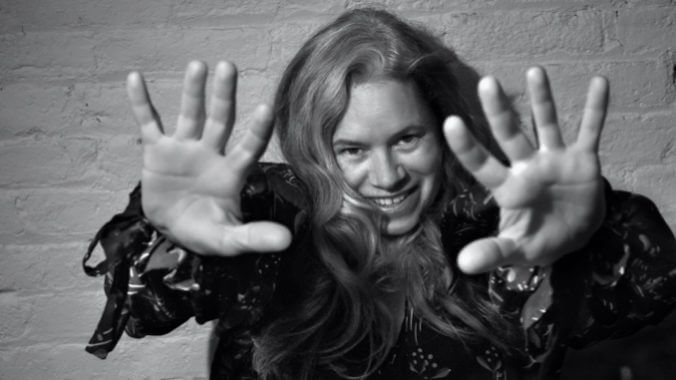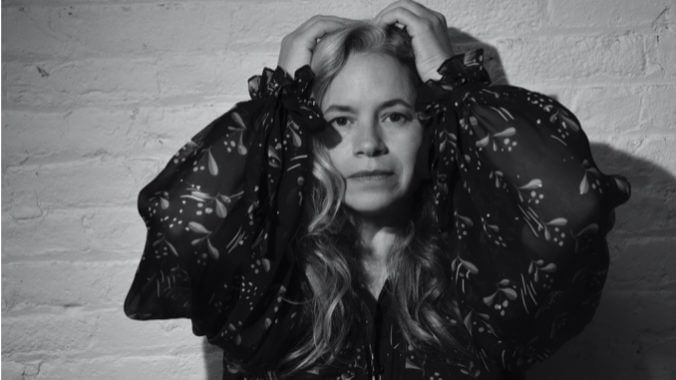Q&A with Natalie Merchant: On Her Old Collections and Her New One, Keep Your Courage
Photo by Shervin Lainez
Looking back on our past three mercurial pandemic years, the sheer darkness of those early-2020 Covid months might just be a hazy memory for many survivors today. Especially, of course, if you’re doing your damnedest to put those lockdown days behind you. But philosophical folk-rocker Natalie Merchant will never forget, she swears. And she’ll always have a small scar as a big reminder. “In March of 2020, I had my neck opened and had three bones taken out of it, and then I went home to be in a neck brace for a couple of months,” she recalls, quite clearly. “But then the doctor, as I was leaving, said, “Nobody in, nobody out for two months. This entire country is gonna shut down.” He knew what was coming because he had had a meeting that morning telling him that they were going to become a Covid hospital, and he had to remove anybody that was high risk, if he could. So the pandemic was dark for everyone, but my pandemic was slightly darker than the average.”
Still, the upstate-New-York based singer/songwriter, at 59, managed to transmute that creepy coronavirus base metal into something approaching iridescent, uplifting gold via her latest aptly-dubbed solo set Keep Your Courage, her ninth, and first since 2017’s “Butterfly.” Her gossamer singing voice is even more resonant, and can go from hearth-fire flickering (the thoughtful “Guardian Angel,” a piano-anchored “The Feast of St. Valentine”) to lute-delicate classic folk phraseology (“Hunting the Wren”, a more pop-jangling “Eye of the Storm”), funky horn-peppered R&B (“Tower of Babel”), and two soulful duets with Resistance Revival Chorus anchor Abena Koomson-Davis (“Big Girls” and “Song of Aphrodite”) which wouldn’t have sounded out of place on an old Stax session from the ’60s. Lyrically, the album revolves around the topic of love, but takes inspiration—as usual for this brainy, erudite composer—from several arcane-but-easily-relatable sources, including literature, Greek mythology, even the poetry of Walt Whitman. She didn’t hide, shivering, from the pandemic. As she’d done in two recent films—the interview-based study of her work, Paradise is There and her personal documentary on domestically abused women, Shelter, she faced the situation head-on and in the process simply rose courageously above, aided by the presence of her daughter, whose college plans all had to be deferred at the tenuous time.

“And I was glad I wasn’t alone, that’s for sure,” says the ex-10,000 Maniacs frontwoman. “Because it was shocking to see the statistics—i think it was like a third of all the adult people in this country were alone.” So she sought solace outdoors, she adds. “I spent so much time outside in the forest, and it was sooo quiet. I’ve lived in this area for 35 years, and I’ve never heard it so quiet. No cars. No airplanes. Just birdsong and the sound of the wind in the trees. So the stillness is what I remember.”
In fact, as Merchant—who’s undertaking a sweeping Keep Your Courage world tour— sees her post-pandemic landscape now, there’s only one minor disturbance to her idyllic rural reverie. “I have a mink that is terrorizing my pond right now, and has been for the past few years,” she’s sad to report. “I wish I could make him go away—they’re voracious killers, but I don’t wanna end my article with how this mink is biting all the heads off my turtles!” No mink or turtles were harmed during this Paste chat, however….
Paste: In all the research information I went through regarding you and this album, there was a two-word phrase that interested me most—“Ephemera collection.” You’ve said that’s where you’ve always kept the photo you used for the album cover of a Joan of Arc statue, ever since childhood. What is it? What does it house or contain? And where, exactly, do you keep it?
Natalie Merchant: Ha! You don’t know what an ephemera collection is? Oh, it takes up a lot of space, too much space in my life, to tell you the truth. I’m a closet archivist, so everything’s in acid-neutral archival boxes of all sizes, all labeled. Like my postcard collection, where everything is labeled according to topics, so I collect WWI postcards, and stereoscopic viewer cards—I probably have 150, just from WWI. I collect what they called Real Photo postcards, actual photographs but in postcard form, from probably 1900 to 1940. I have about a thousand of those.
Paste: What are some of your rarest acquisitions?
Merchant: Where I’m like, “I can’t believe I found that?” I have a small carte de visite of a Shaker woman. They’re the cards that people would leave when they’d come to visit—they would leave a card if they couldn’t see the person, or they would leave it as a gift. And I also have a German woman, a carte de visite that is her profile, but from the front of her cape to the back of her head—she had a good sense of humor. She just turned around to the camera and had the back of her head taken, which I’d never seen before. So there are three different views of her head—very funny. So anyway, yeah, I have a huge collection of ephemera, and Joan of Arc came from that. I was going through some of my portfolios, and she was in one of them.
Paste: But you were just a teen when you collected the picture, you’ve said. And that appealed to you back then?
Merchant: I lived in a small town, Jamestown, New York, where we had to make our own entertainment. And something that was really inexpensive was old books and postcards and magazines, and I would take them home and make collages with some of them. But mostly I just hoarded them away, and now I still have them. And I would ache to live in a different time, I really would.
-

-

-

-

-

-

-

-

-

-

-

-

-

-

-

-

-

-

-

-

-

-

-

-

-

-

-

-

-

-

-

-

-

-

-

-

-

-

-

-








































